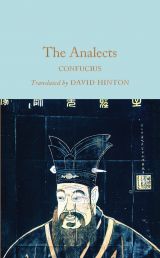The Analects

| Autor: |
Confucius
|
| Jazyk: |
anglicky |
| Vazba: |
pevná |
| Počet stran: |
240 |
| Formát: |
10,1 x 15,8 cm |
| ISBN/EAN: |
9781529080100 |
| Překladatel: |
David Hinton |
| Nakladatel: |
Macmillan Collector's Library |
| Rok vydání: |
2022 |
| Edice: |
Klasická beletrie
/ Beletrie
|
Formed in a time of great unrest in ancient China, The Analects is vital to an understanding of Chinese history and thought, and, 2,500 years on, it remains startlingly relevant to contemporary life.
Complete and unabridged. Part of the Macmillan Collector’s Library; a series of stunning, cloth-bound, pocket-sized classics with gold foiled edges and ribbon markers. These beautiful books make perfect gifts or a treat for any book lover. Highly regarded for the poetic fluency he brings to his award–winning work, David Hinton's translation is inviting and immensely readable.
Confucius, the ‘great sage’ of China, believed that an ideal society is based on humanity, benevolence and goodness. His profoundly influential philosophy is encapsulated in The Analects, a collection of sayings which were written down by his followers. Confucius advocates an ethical social order, woven together by selfless and supportive relationships between friends, families and communities. He taught that living by a moral code based on education, ritual, respect and integrity will bring peace to human society.
About the Author
Confucius (551–479 BCE) was born into a noble family in the Chinese state of Lu. His father died when he was very young and the family fell into poverty. Confucius resigned from a political career and then travelled for many years, searching for a province willing to adopt his ideas. Unsuccessful, he returned to Lu where he spent the rest of his life teaching. He is considered one of the most influential figures in the world.
David Hinton has translated many volumes of classical Chinese poetry and is the first translator in nearly two centuries to translate all five of the seminal classics in Chinese philosophy. This work has earned him many national awards in the United States, including a lifetime achievement award from the American Academy of Arts and Letters. His recent book of essays, Hunger Mountain: A Field Guide to Mind and Landscape was on the Best-Books-of-the-Year list at the Guardian.
Diskuze
Žádný příspěvek do diskuze. Přidejte svůj názor »
|







